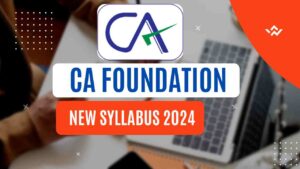As of July 2, 2023, the Institute of Chartered Accountancy of India (ICAI) has approved and will be launching a new syllabus for the CA Foundation course, CA Intermediate, and CA Final.
The new syllabus is aligned with the National Education Policy (NEP) 2020 and will come into effect by June 2024. The President of India, Droupadi Murmu, is expected to launch the new CA syllabus on July 1, 2023.
- Paper 1: Accounting (100 Marks)
- Paper 2: Business Laws (100 Marks)
- PAPER 3: Quantitative Aptitude (100 Marks)
- PAPER 4: Business Economics (100 Marks)
- FAQs (Frequently Asked Questions)
- Q1: What are the key changes in the CA Foundation syllabus for 2024?
- Q2: How can I effectively prepare for the CA Foundation examination?
- Q3: Are there any resources available to help me understand the CA Foundation syllabus better?
- Q4: Can I pursue CA Foundation without any prior commerce background?
- Q5: What is the passing criteria for the CA Foundation examination?
- Q6: Can I attempt the CA Foundation examination in the medium other than English?
Here are the subject-wise details of the CA Foundation New Syllabus 2024:
Paper 1: Accounting (100 Marks)
Objective: Develop an understanding of basic accounting concepts and principles and apply them in preparing financial statements and solving simple problems.
Contents:
- Theoretical Framework:
- Meaning and Scope of Accounting.
- Accounting concepts, principles, and conventions.
- Capital and revenue expenditure, capital and revenue receipts, contingent assets, and contingent liabilities.
- Accounting policies.
- Accounting as a measurement discipline – valuation principles, accounting estimates.
- Accounting Standards – concepts and objectives.
- Accounting Process:
- Recording accounting transactions: principles of double-entry bookkeeping, books of original entry – journal, subsidiary books, cash book, ledger format, posting from journal and subsidiary books, balancing of accounts.
- Preparation of trial balance.
- Rectification of errors.
- Bank Reconciliation Statement:
- Introduction, reasons, and preparation of bank reconciliation statement.
- Inventories:
- Meaning, basis, and technique of inventory valuation, cost of inventory, net realizable value, and record system.
- Depreciation and Amortization:
- Tangible and intangible assets – meaning and difference, concepts, methods of computation, and accounting treatment of depreciation/amortization, change in depreciation method.
- Bills of Exchange and Promissory Notes:
- Meaning of bills of exchange and promissory notes and their accounting treatment; accommodation bills.
- Preparation of Final Accounts of Sole Proprietors:
- Elements of financial statements, closing adjustment entries, trading account, profit and loss account, and balance sheet of manufacturing and non-manufacturing entities.
- Financial Statements of Not-for-Profit Organizations:
- Significance and preparation of receipt and payment account, income and expenditure account, and balance sheet; difference between profit and loss account and income and expenditure account.
- Accounts from Incomplete Records (excluding preparation of accounts based on ratios).
- Partnership and LLP Accounts:
- Final accounts of partnership firms and LLPs.
- Admission, retirement, and death of a partner, including treatment of goodwill.
- Dissolution of partnership firms and LLPs, including piecemeal distribution of assets.
- Company Accounts:
- Definition of shares and debentures.
- Issue of shares and debentures, forfeiture of shares, re-issue of forfeited shares.
- Redemption of preference shares and debentures (excluding purchase and redemption of own debentures and sinking fund method).
- Accounting for bonus issue and right issue.
Paper 2: Business Laws (100 Marks)
Objective: Develop general legal knowledge of the law of Contracts, Sales, and understanding various forms of businesses and their functioning to regulate the business environment and acquire the ability to address basic application-oriented issues.
Contents:
- Indian Regulatory Framework:
- Major Regulatory Bodies such as the Ministry of Finance, Ministry of Corporate Affairs, SEBI, RBI, IBBI, Ministry of Law and Justice, etc.
- The Indian Contract Act, 1872:
- General nature of the contract, consideration, other essential elements of a valid contract, performance of contract, breach of contract, contingent and quasi contract, contract of indemnity and guarantee, contract of bailment and pledge, contract of agency.
- The Sale of Goods Act, 1930:
- Formation of the contract of sale, conditions and warranties, transfer of ownership and delivery of goods, unpaid seller and his rights.
- The Indian Partnership Act, 1932:
- General nature of partnership, rights and duties of partners, reconstitution of firms, registration and dissolution of a firm.
- The Limited Liability Partnership Act, 2008:
- Introduction – covering nature and scope, essential features, characteristics of LLP, incorporation, and differences with other forms of organizations.
- The Companies Act, 2013:
- Essential features of a company, corporate veil theory, classes of companies, types of share capital, incorporation of a company, memorandum of association, articles of association, doctrine of indoor management.
- The Negotiable Instruments Act, 1881:
- Meaning of negotiable instruments, characteristics, classification of instruments, different provisions relating to negotiation, presentment of instruments, rules of compensation.
Note: If new legislations are enacted to replace the existing legislations, the syllabus will include the corresponding provisions of such new legislations with effect from the dates notified by the Institute.
PAPER 3: Quantitative Aptitude (100 Marks)
Objective: Develop an understanding of basic mathematical and statistical tools and apply them in business, finance, economic situations, and develop logical reasoning skills.
Contents: The whole syllabus of Quantitative Aptitude is divided into three broad areas:
A. Business Mathematics (40 Marks):
- Ratio and proportion, indices and logarithms.
- Equations: Linear, simultaneous linear equations, quadratic and cubic equations.
- Linear inequalities.
- Mathematics of Finance: Simple interest, compound interest, nominal and effective rate of interest, present value, net present value, future value, perpetuity, annuities, sinking funds, calculating EMI, calculations of returns.
- Permutations and combinations.
- Sequence and series.
- Sets, relations, and functions.
- Basic applications of differential and integral calculus in business and economics.
B. Logical Reasoning (20 Marks):
- Number series, coding and decoding, odd man out.
- Direction tests.
- Seating arrangements.
- Blood relations.
C. Statistics (40 Marks):
- Statistical representation of data.
- Sampling.
- Measures of central tendency and dispersion.
- Probability.
- Theoretical distributions.
- Correlation and regression.
- Index numbers.
PAPER 4: Business Economics (100 Marks)
Objective: Develop an understanding of the concepts and theories of economics and acquire the ability to address application-oriented issues.
Contents:
- Introduction to Business Economics: Meaning and scope.
- Basic problems of an economy and role of price mechanism.
- Theory of demand and supply.
- Theory of consumer’s behavior.
- Theory of production and cost.
- Price determination in different markets: Perfect competition, monopoly, and monopolistic competition.
- Price determination in these markets.
- Determination of national income.
- Business cycles.
- Public finance.
- Money market.
- International trade.
- Exchange rates and their economic effects.
- International capital movements.
FAQs (Frequently Asked Questions)
Q1: What are the key changes in the CA Foundation syllabus for 2024?
The CA Foundation syllabus for 2024 introduces a new subject, “Business Economics and Business and Commercial Knowledge,” and revises the existing subjects to align with the evolving business landscape. The aim is to equip students with the necessary knowledge and skills for the chartered accountancy profession.
Q2: How can I effectively prepare for the CA Foundation examination?
To effectively prepare for the CA Foundation examination, it is essential to create a study plan, allocate sufficient time for each subject, practice solving previous years’ question papers, and seek guidance from experienced mentors or coaching institutes. Additionally, staying updated with the latest syllabus and exam pattern is crucial.
Q3: Are there any resources available to help me understand the CA Foundation syllabus better?
Yes, there are various resources available to help you understand the CA Foundation syllabus better. You can refer to the official ICAI publications, study materials provided by coaching institutes, online video tutorials, and reference books authored by subject matter experts. Additionally, you can participate in online forums and discussion groups to clarify your doubts and exchange knowledge with fellow aspirants.
Q4: Can I pursue CA Foundation without any prior commerce background?
Yes, you can pursue CA Foundation even if you don’t have a prior commerce background. The CA Foundation course is open to students from all academic backgrounds. However, it is advisable to have a basic understanding of accounting and business concepts to enhance your learning experience.
Q5: What is the passing criteria for the CA Foundation examination?
To pass the CA Foundation examination, you need to secure a minimum of 40% marks in each subject and a minimum aggregate of 50% marks across all subjects in a single attempt. The passing criteria may vary if you avail exemptions based on your educational qualifications.
Q6: Can I attempt the CA Foundation examination in the medium other than English?
Yes, the CA Foundation examination is conducted in both English and Hindi mediums. You can choose your preferred medium while filling the examination application form.


